| |
— News & Agenda —
|
|
| |
|
|
| |
 |
|
| |
|
|
| |
XIII Cycle "Segovians Speaking
of Segovia"
Conference on Heritage and Technology at
the Esteban Vicente Museum
AMARC-IEU:17/12/2025
On Tuesday, 15th December, Miguel Larrañaga Zulueta,
Director of the Antiquity & Middle Ages Research Centre
at IE University, presented the CAVCA Project,
emphasising the importance of multidisciplinary
collaboration and the interplay between heritage,
applied technologies, the cultural sector, and economic
development. The conference, organised by the Friends of
Segovia's Heritage Association, was held at the Esteban
Vicente Museum of Contemporary Art in Segovia.
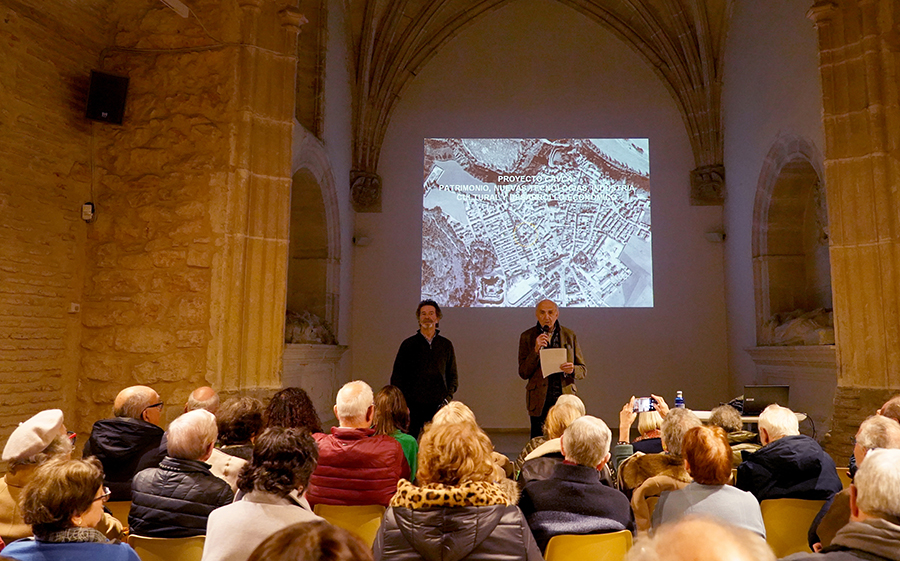 |
|
| |
Pedro Montarelo introducing Miguel Larrañaga in the
chapel-auditorium of the Esteban Vicente Museum. / IEU. |
|
| |
|
|
| |
 |
|
| |
|
|
| |
Heritage and economic
development in the Digital Age
Digital Heritage Conference 2025, Riyadh
IESH: 16/12/2025
IE School of Humanities was honoured to participate in
the Digital Heritage Conference, held on 8–9 December in
Riyadh and organised by the Heritage Commission | هيئة
التراث. This key international forum fosters research,
innovation, and education in the fields of cultural
heritage and technology.
Representing IE University, Dr Miguel Larrañaga Zulueta,
Vice-Rector and Director of the Antiquity & Middle Ages
Research Centre, delivered a presentation on the role of
digital heritage in enhancing cultural and tourism
initiatives. He highlighted how digital tools can
support regional development and contribute to the
revitalisation of rural areas. His remarks underscored
the social impact of applied research at the
intersection of heritage, technology, and public policy.
In parallel, Dr Rubén Montoya González, Adjunct
Professor at IE School of Humanities, led a workshop on
curriculum design and learning experiences in digital
heritage and archaeology. His session showcased IE
University’s commitment to pedagogical innovation and to
preparing students to engage critically with the digital
transformation of the cultural sector.
[Video]
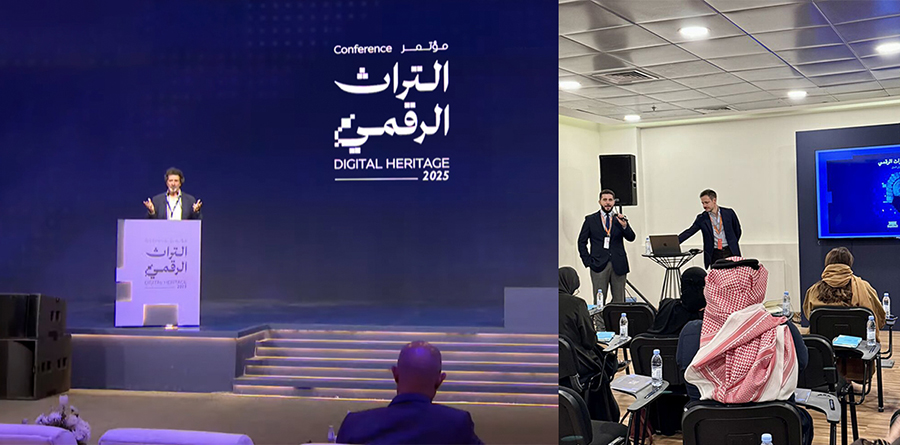 |
|
| |
Professors Miguel Larrañaga and Rubén Montoya at the
Digital Heritage Conference 2025. / هيئة التراث |
|
| |
|
|
| |
 |
|
| |
|
|
| |
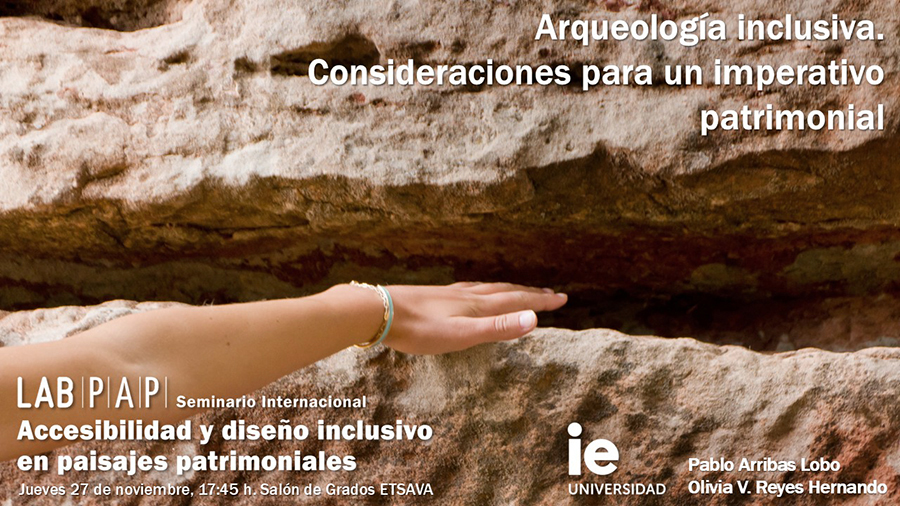 |
|
| |
|
|
| |
 |
|
| |
|
|
| |
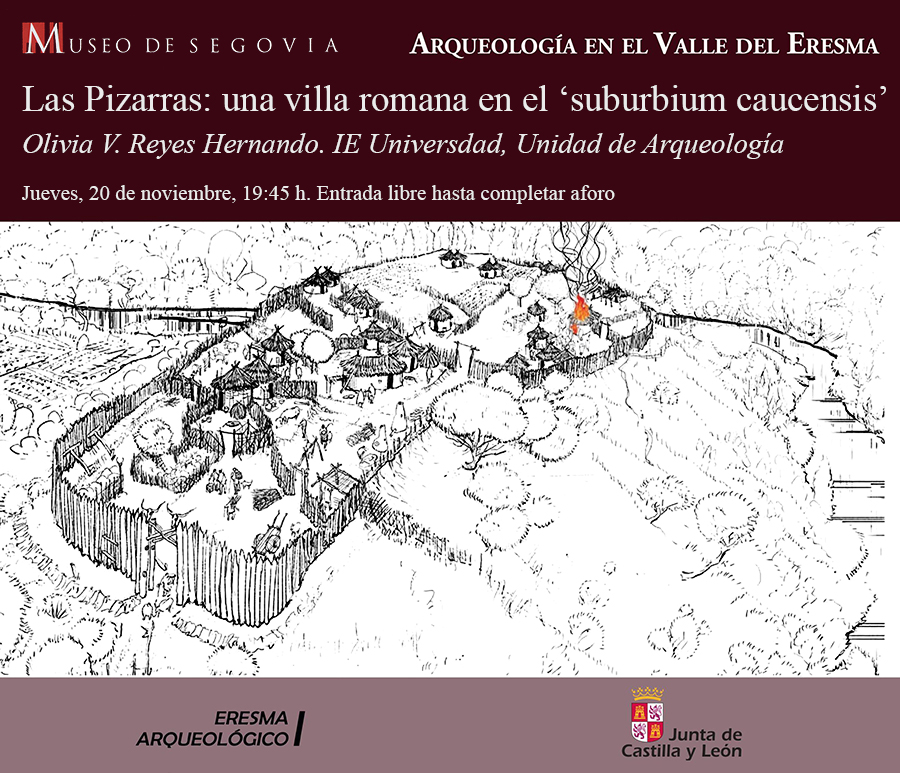 |
|
| |
|
|
| |
 |
|
| |
|
|
| |
 |
|
| |
|
|
| |
 |
|
| |
|
|
| |
 |
|
| |
|
|
| |
 |
|
| |
|
|
| |
History and Archaeology Club
October 10-12. Trip to Tiermes, Berlanga
and Gormaz
AMARC-IEU: 23/10/2023
Members of the IE History and Archaeology Club have
explored Iron Age, Roman and Middle Ages archaeology,
with the Archaeology Unit and Antiquity & Middle Ages
Research Centre. The places visited were
the archaeological site of Tiermes, the hermitages of
San Baudelio de Berlanga and San Miguel de Gormaz, and
the fortress of Gormaz, in the southwest of the province
of Soria (Spain), as examples of the rich historical heritage of
this region.
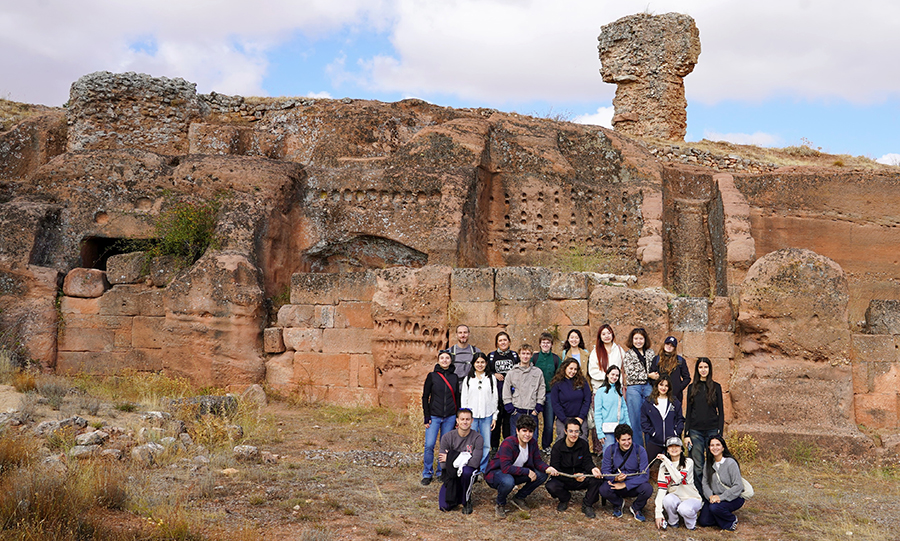 |
|
| |
The Archaeology and History Club and the IE Archaeology
Unit at the archaeological site of Tiermes (Soria,
Spain). / IEU. |
|
| |
|
|
| |
 |
|
| |
|
|
| |
IE School of Humanities
September 27-28. Field trip
AMARC-IEU: 23/10/2023
First-year Humanities and Humanities/Business students
from IEU spent a weekend in Tiermes and Berlanga (Soria,
Spain), accompanied by members of the Archaeology Unit
and the Antiquity and Middle Ages Research Centre.
Cultural visits, workshops on archaeological materials
and applied technologies, and debates on history,
legislation, and iconography offered them the
opportunity to engage with archaeology, medieval
heritage, and emerging technologies.
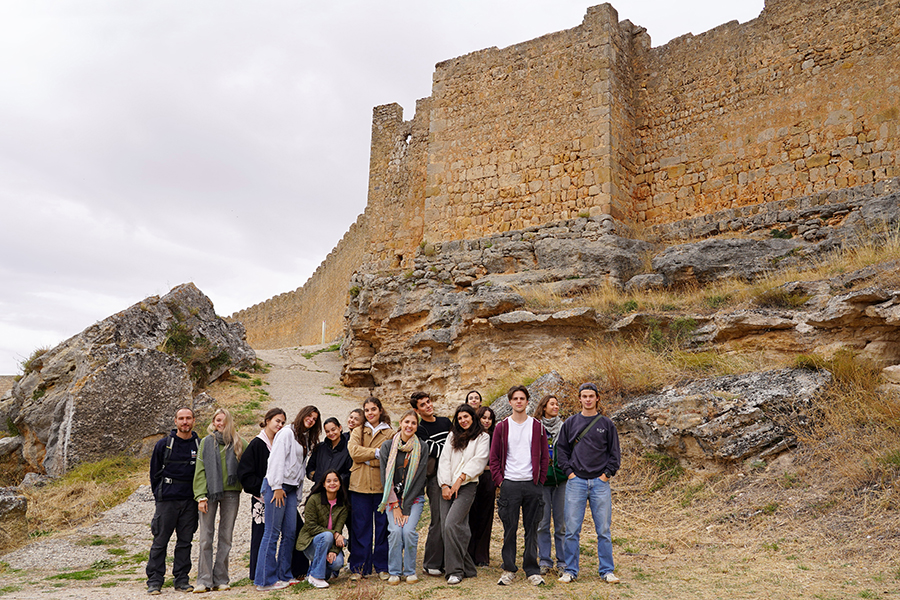 |
|
| |
Humanities and Dual
Humanities & Business students at the fortress
of Gormaz (Soria). / IEU. |
|
| |
|
|
| |
 |
|
| |
|
|
| |
The legacy of Rome in the
Archaeological heritage of Riaguas de San Bartolomé (Segovia)
EL ADELANTADO DE SEGOVIA: 04/09/2025
Forty years after the discovery of a
Roman mosaic in the municipal area of Riaguas de San
Bartolomé, the local council organized an exhibition
aimed to commemorate the find. Dr Olivia Reyes,
researcher of the IE University Archaeology Unit, was
invited to present key aspects of her research on Roman
villas in the Segovian region, focusing on the nature of
these rural settlements and the archaeological evidence
linked to the ancient territory of Riaguas de San
Bartolomé. The exhibition aroused great interest among
residents and visitors alike, drawing a
large turnout.
[Further information]
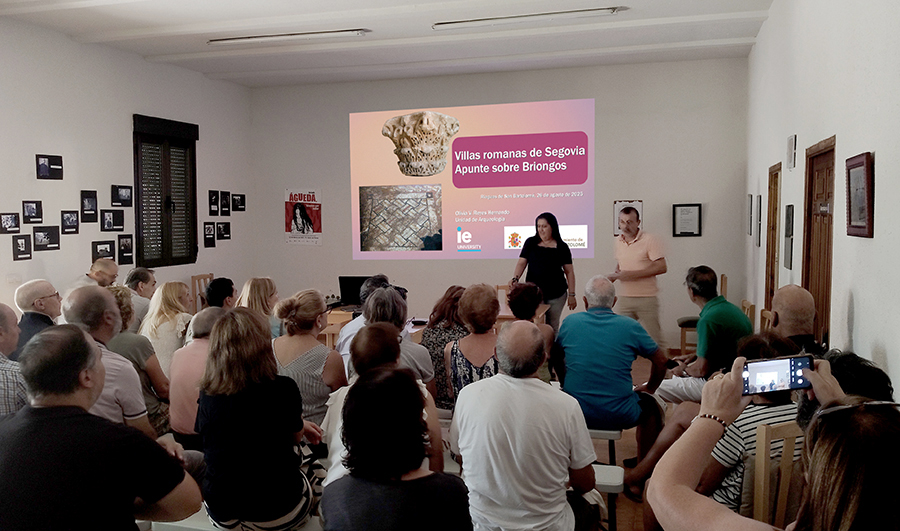 |
|
| |
Professor Olivia V. Reyes. / IEU. |
|
| |
|
|
| |
 |
|
| |
|
|
| |
 |
|
| |
|
|
| |
 |
|
| |
|
|
| |
'Marmora' in the architecture
of the Roman villa of Las Pizarras (coca, Segovia)
The Archaeology Unit of IE University participates in
the 5th CISEM International Congress
AMARC-IEU: 14/04/2025
On its 5th edition, this International scientific
meeting held by the Archaeological Museum of Siracusa
(Sicily, Italy; 9th- 12th of April 2025) focused on Late
Antique housing and topics concerned (architectural
forms, furnishing, housing topography, construction
techniques and subsequent transformations). On this
occasion, the members of the Archaeology Unit and
Antiquity & Middle Ages Research Center of IE University
were invited to showcase the marble revetments and
similar architectural marmor of the Roman villa of Las
Pizarras (Coca, Segovia), reaching interesting comments
and a warm reception of the results submitted.
[Further information]
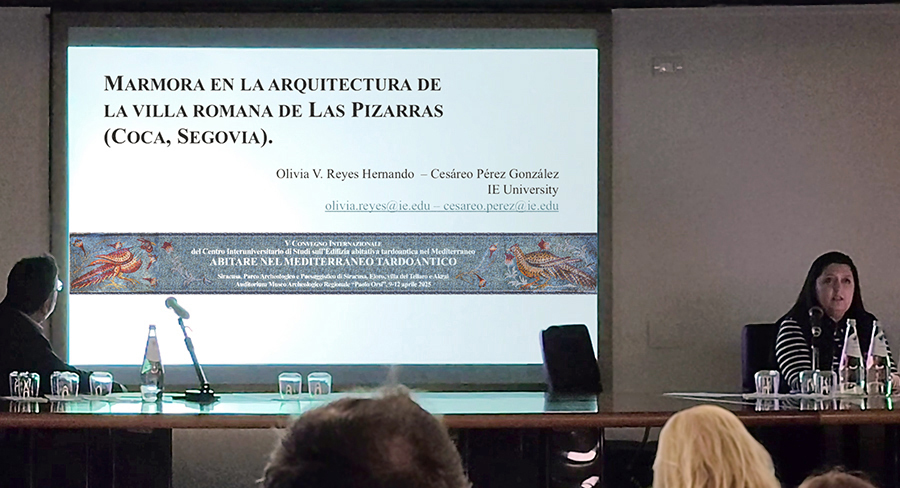 |
|
| |
Professor Olivia V. Reyes. / IEU. |
|
| |
|
|
| |
 |
|
| |
|
|
| |
Alfonso II and the Beginnings
of the Jacobean Cult
By Miguel Larrañaga Zulueta (Antiquity and Middle Ages
Research Centre)
AMARC-IEU: 17/03/2025
There are few certainties surrounding the origins of the
Jacobean cult, which provide many hypotheses. The
origins of the Jacobean cult remain primarily uncertain
and provide numerous hypotheses. The official version
(and popular belief), with extensive literature on it,
relies on the biblical text that mentions the martyrdom
of Saint James the Great in the later medieval tradition
(12th century), narrated by the Historia Compostelana:
the apostle died beheaded in the Holy Land during the
time of Herod Agrippa, around the year 44 CE, and his
body taken to a remote location in Galicia, where it
would be miraculously discovered by Bishop Teodomiro of
Iria Flavia, present-day Padrón, in the early decades of
the 9th century. When King Alfonso II of Asturias
(791-842) received news of the discovery, he became the
first pilgrim to visit the sacred tomb...
[Read
more]
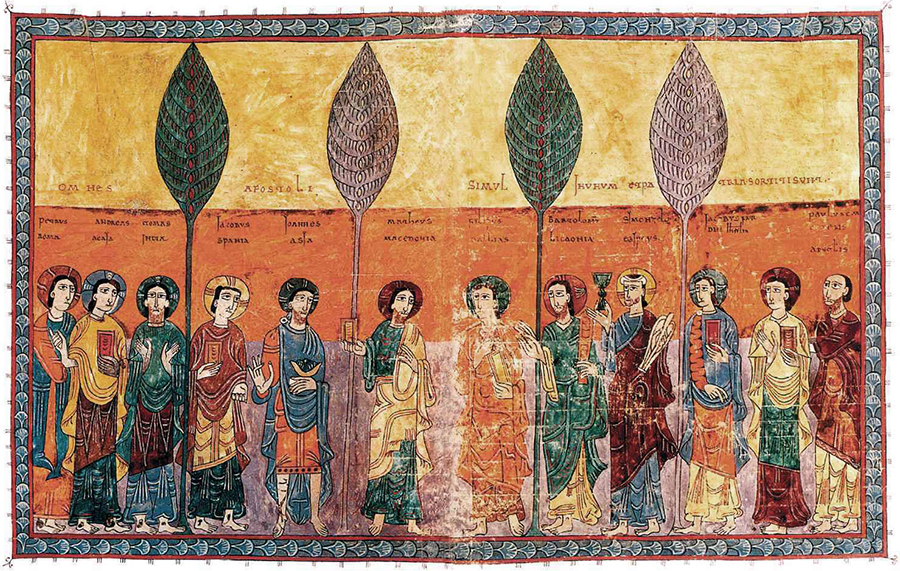 |
|
| |
Depiction of the apostles with inscriptions identifying
them. One of them reads: IACOBVS SPANIA. / Beatus of
Gerona. |
|
| |
|
|
| |
 |
|
| |
|
|
| |
New volume of "Oppidum.
Cuadernos de investigación"
AMARC-IEU: 14/03/2025
The IE University Archaeology Unit presents the 20th
volume of this scientific journal. It contains
papers from
different researchers specialising in the
fields of Humanities and Heritage Sciences. You can get
access to the contents on Oppidum's website:
http://oppidum.es
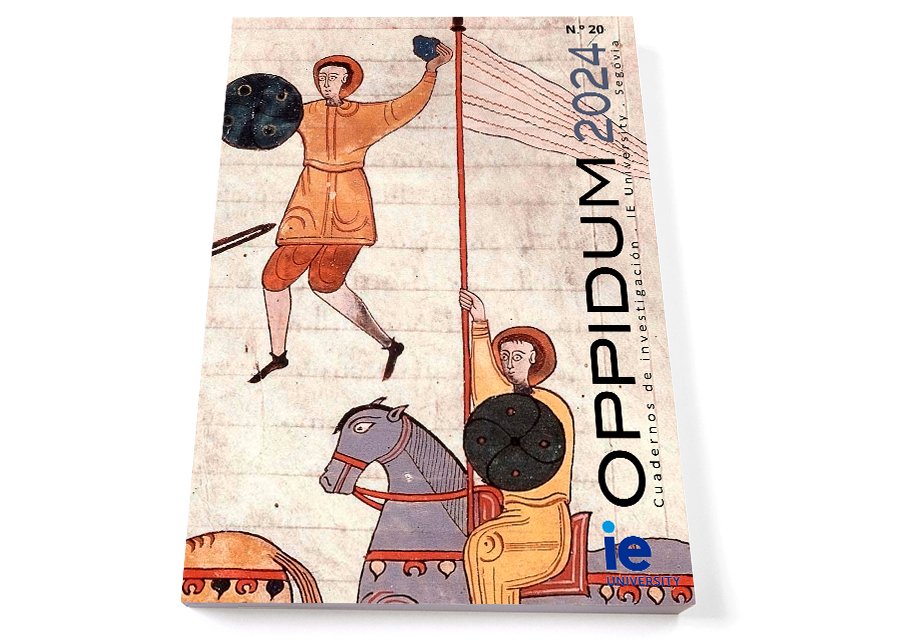 |
|
| |
|
|
| |
 |
|
| |
|
|
| |
Archaeology and architecture
in the Roman villa of Villabermudo de Ojeda (Palencia,
Spain)
New IE University contributions to the
study of Antique Architecture
AMARC-IEU: 07/03/2025: 17/12/2024
More than 180 years after the
discovery of the Roman villa of Los Pradillos
(Villabermudo), the IEU Archaeology Unit academics have
recently published an original paper about the
archaeological background and the optimal results
achieved during the geophysical survey carried out in
this archaeological site. This work, combining several
research lines developed by the "Antiquity & Middle Ages
Research Centre" (AMARC), was presented at the 4th
International Congress of the CISEM (Centre for Studies
on Late Antique Housing in the Mediterranean) and is
part of the Proceedings recently published. It was held
at Cuenca (November 2022), attended by the principal
referring researchers in the study of housing, urban
planning and territory in Late Antiquity.
[Further information]
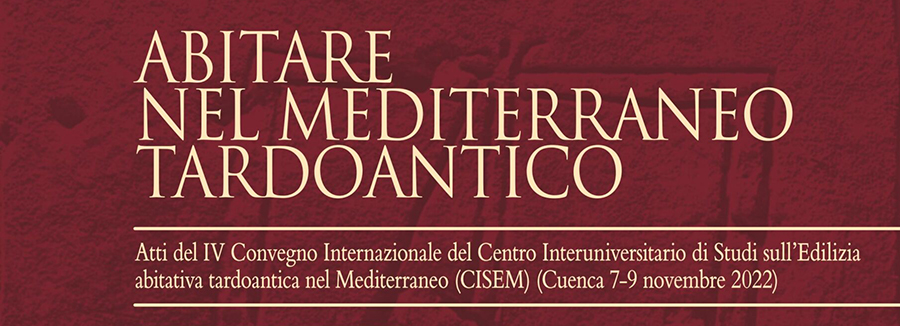 |
|
| |
|
|
| |
 |
|
| |
|
|
| |
New life for the old hospital
in Coca (Segovia, Spain)
The Town Council and IE University join forces to
convert the former health centre into a Historical
Interpretation Centre
EL DÍA DE SEGOVIA: 07/02/2025
Coca's rich heritage is a gift. Its imposing castle
crowns the town, but despite being best known for being
one of the most beautiful examples of Spanish
Gothic-Mudejar art, the municipality hides other charms.
With the aim of promoting all that is not so visible,
the Coca Town Council and IE University have signed a
collaboration agreement through which they join forces
to enhance the attractiveness of the town. The idea is
to carry out the rehabilitation of the old hospital of
La Merced to create a Historical Interpretation Centre
to boost the local cultural industry and promote
sustainable tourism linked to the knowledge of
historical and natural heritage.
[Read
more]
 |
|
| |
Technological recreation of the historical monuments and
walls of the town of Coca. / R. Canna |
|
| |
|
|
| |
 |
|
| |
|
|
| |
CAVCA Project: Heritage, cultural industry,
sustainable economy and new technologies in Coca
(Segovia, Spain)
On Friday 17 January, the Martín Frías Auditorium hosted
the presentation of the project led by IE University,
which aims to promote respectful and sustainable
economic development in the municipality
COCA TOWN COUNCIL: 19/01/2025
The event, presented by the Mayor of Coca, Fernando
Aceves, aimed to present the objectives of the recent
collaboration agreement signed between IE University and
the Coca Town Hall, as a first step to materialise
the CAVCA project, a transversal plan based on
innovation and the development of new technologies
applied to the cultural and natural heritage of Coca and
the creation of new dynamics oriented towards the
development of quality cultural tourism. This initiative
aims to lay the foundations for the emergence of a
self-managed local cultural industry, necessary to
achieve a model of sustainable economic development in
the municipality, as the future economic engine of this
Segovian community, based on the initial obtaining of
European funds.
[Read
more]
 |
|
| |
Martín Frías Auditorium, in Coca, in Coca. / D.R. |
|
| |
|
|
| |
 |
|
| |
|
|
| |
Previous news |
|
|

